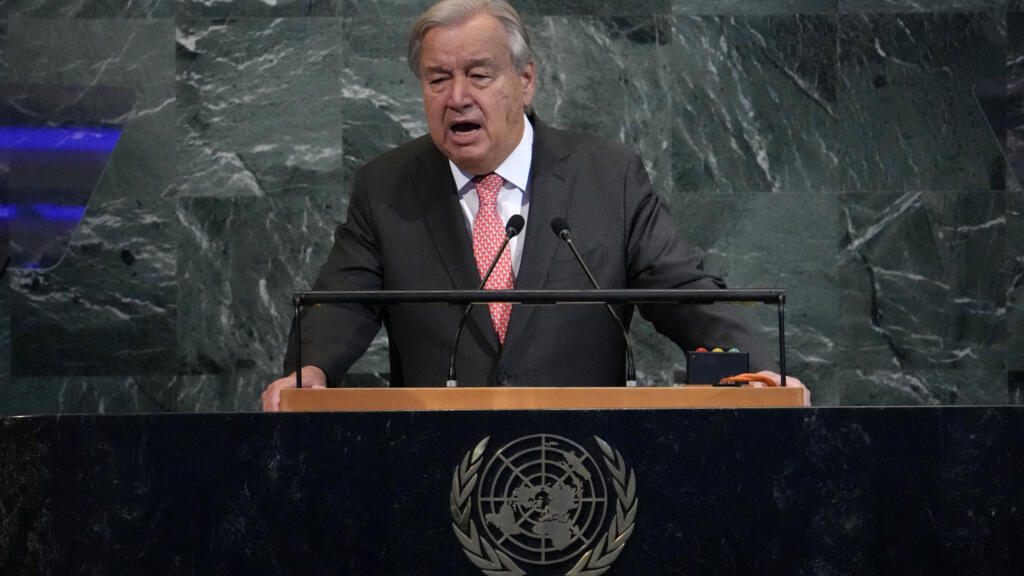
The United Nations' founding charter, which aimed "to save succeeding generations from the scourge of war", came into effect 80 years ago this month. But as today's members wrap up the annual General Assembly in New York, conflict is more than ever on the agenda, casting doubt over the UN's efficiency.
Fifty countries came together in the aftermath of World War II to sign the UN Charter in June 1945, in San Francisco, and it came into force on 24 October that year.
Current UN Secretary-General Antonio Guterres has insisted that the Charter "is a promise of peace, dignity and cooperation among nations".
But critics say the organisation has been utterly helpless in stopping the countless conflicts that have broken out since its inception and which continue around the globe today.
US President Donald Trump mocked the international body in his address on 22 September, blasting it for failing to bring peace.
"What is the purpose of the United Nations?" he asked.
"All they seem to do is write a really strongly worded letter. It's empty words, and empty words don't solve war."
He even took a swipe at Guterres's leadership, after a meeting on the sidelines, telling reporters: "The UN could be unbelievable with certain people running it."
This came after Guterres warned in his opening remarks that aid cuts led by the United States were "wreaking havoc" in the world.
As Trump rails at UN and shifts Ukraine stance, Macron urges US to end Gaza war
Other countries have also spoken of frustration over how the UN is run.
In an interview with France 24 from the UN in New York, Kenya's President William Ruto warned that "unless the UN is reformed, its own survival is at stake".
He called for changes to the UN Security Council and international financial architecture.
Peaceful settlement of disputes
Conceived in the early years of World War II and signed on 26 June, 1945 in San Francisco, the Charter paved the way for the creation of the United Nations on 24 October, 1945.
In 19 chapters and 111 articles, the Charter lays out the principles of international relations, including the peaceful settlement of disputes, sovereignty and equality between states, humanitarian cooperation, and respect for human rights.
If there is a threat to global peace, Chapter VII gives the UN Security Council the power to impose sanctions to enforce its decisions or even deploy military force.
Macron recognises Palestinian state at UN, defying Israel and United Sates
The Charter, which is very difficult to amend, also establishes the Security Council, with its five veto-wielding permanent members (US, China, Russia, France, UK), the General Assembly and the Secretariat, as well as the International Court of Justice.
The United Nations currently has 193 member states.
It has also over the years, developed a number of missions that were not envisioned by its founders in 1945.
These include sustainable development goals for 2030, and an agreement by members on climate action to limit global warming.
Despite the body's best intentions when it comes to conflict, the Charter's principles have been continually violated across the planet for eight decades.
Member states rarely agree whether self-determination trumps non-interference in a state's internal affairs, or if the right to self-defence can justify acts of aggression.
UN Climate Summit gathers momentum in New York ahead of Brazil's Cop30
Collective self defence
In a recent example, Iran, backed by veto-wielding China, accused Washington of violating the UN Charter by striking Iranian nuclear sites in June – an act the United States justified by the right to "collective self-defense".
And the international community has never really addressed the "crime of aggression," said Gissou Nia, a fellow with the Atlantic Council think tank – be it Russia's war against Ukraine or the US invasion of Iraq in 2003.
"Once impunity reigns on one set of violations, one that's never dealt with, it continues, and countries use it as justification for the actions that they take," Nia told French news agency AFP.
She added: "For self-defence, you really have to show evidence of an imminent attack. I think that it's one of the more contentious issues that involve the UN Charter and the narrative has really gotten away from us."
Russia's invasion of Ukraine in February 2022 was denounced as a clear violation of the Charter by Guterres and the General Assembly, but not by the Security Council, where Russia has a veto.
And even though the Charter allows for persistent violators to be expelled from the UN, that has never happened.
In 1974, the UN did, however, suspend South Africa from the General Assembly over crimes of apartheid – a ban that lasted two decades.
(with newswires)







